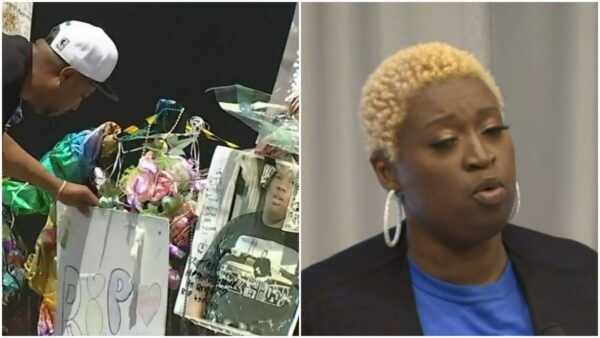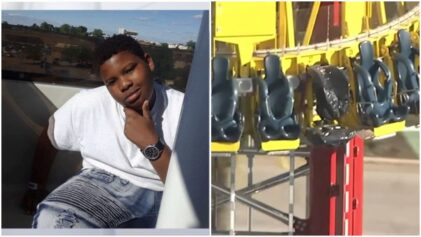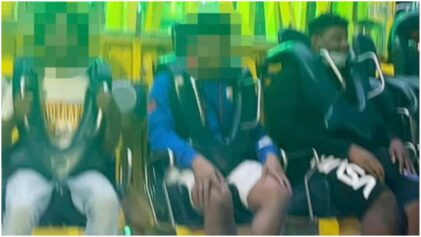The family of a St. Louis teenager who plummeted to his death while riding an amusement park attraction in Florida last month has filed a lawsuit against several parties.
The parents have identified the actual park, the ride operator, the manufacturer, and more as defendants in the court document, claiming all parties were negligent in 50 precautionary acts that could have saved Tyre Sampson’s life.

One point of contention in the lawsuit filed Monday in Orange County, Florida, states the park skimped on purchasing a $660 harness addition ($22 per seat) that would have provided more support to the child.
According to a 65-page wrongful death complaint obtained by the Atlanta Black Star, filed almost a month after the incident, Nekia Dodd and Yarnell Sampson are seeking justice in the tragic death of their son.
Their lawyers have identified the following parties to include ICON Park; SlingShot, the owners and operators of the Orlando FreeFall; the ride builder, Keator Construction; the ride’s manufacturer, Austria-based Funtime Handels; and the manufacturer of the seats and harnesses, Germany-based Gerstlauer Amusement Rides as the responsible parties, claiming had each company failed to take the proper safety measures on the day of the accident.
The family is not suing the unidentified individual employees who worked on the FreeFall ride at the time of Sampson’s death.
On March 24, the honor student was permitted on a Free Fall attraction at Icon Park in Orlando, despite being too big to ride.
A report submitted by forensic engineers from the Florida Department of Agriculture and Consumer Services (FDACS) maintains Sampson, who was 6 feet 2 and 380 pounds, was 100 pounds too heavy to get on the ride. However, the operator allowed him to board anyway, and “manually loosened, adjusted, and tightened” the harness sensors “to allow a restraint opening of near 7 inches.” The opening should have only been 3 inches.
As a result, the middle school football player slipped out of his seat to his death as the ride plunged from more than 400 feet in the air at 75 miles per hour.
The report assessed, “The cause of the subject accident was that Tyre Sampson was not properly secured in the seat primarily due to mis-adjustment of the harness proximity sensor.”
“The mis-adjustment of the sensor allowed both safety lights to illuminate, improperly satisfying the ride’s electronic safety mechanisms and allowing the ride to commence even though the ride was unsafe,” it continued.
Dodd’s lawyer Michael Haggard asserts the operator made the adjustment instead of sharing the truth about the FreeFall’s capacity, based on its manual, with the public.
He noted nowhere around the attraction was a sign that warned riders of the height and weight restrictions, nor did it have a scale near to weigh those revelers looking to partake in the fun but may have appeared to exceed the weight requirements.
In an interview with CNN, Haggard said, “The manufacturer in the manual says right there and then that you cannot be over 287 pounds. Yet they don’t provide a scale. They don’t tell the ride operator you need to have a scale, if weight is in question.”
He continued, “Yet at this ride in Orlando, the FreeFall ride, they have a metal detector. So you go through a metal detector, which there’s no risk of that associated with the ride, except maybe the keys could fall out and hit somebody.”
The lawsuit states, “Tyre stood at approximately 6’2 and weighed approximately 380 pounds. No weight or height restrictions were posted at the ticket counter and no Icon or Slingshot Defendant employees, agents, apparent agents, servants, or contractors advised Tyre about any weight or height restrictions.”
Fifty points of recklessness were carefully detailed in the complaint for each defendant.
Among them was the assertion employees were not trained to operate the attraction at the park, accusing Icon Park of failing to take reasonable measures to ensure the riders were secured safely in their seats. The lawsuit also says the ride operators were not terminated when they didn’t follow the proper procedures listed in the training and manual.
“The Free Fall ride was dangerous to an extreme beyond that which would be contemplated by the ordinary user with the ordinary knowledge common to the community as to the free Fall’s characteristics,” the claim states.
One aspect of the ride that made it particularly dangerous was the type of precautionary measures the manufacturer neglected to add.
The lawsuit says, “While most free fall rides of this type have both a shoulder harness and a seatbelt, this subject Free Fall ride only had an over-the-shoulder harness to ‘secure’ riders.”
This small adjustment, adding a double seat belt combination to the ride’s design, would not have been a great expense to the company, according to the claim, “all of the seats combined would cost approximately $660.”
Haggard addressed this fact, saying, “What’s really sad about this is that had they put the seat belt in, it would have cost $22 (per seat). You would have paid for that in two to three rides.”
“In one night, this would have been paid for and this would have never happened.”
The attorney noted that others before Sampson’s death complained about how loose the seats were set up on the first two rides.
“We’ve had a number of witnesses come forward who were riding in Seat 1 prior to the incident who have complained that they felt like it was loose, that it was different than the other seats,” Haggard said, before continuing, “They can look across and see somebody else’s is tighter than them. There were a number of complaints beforehand. Nobody fell out, thank God, but there were definitely complaints from previous witnesses that will testify.”
The lawsuit says, Yarnell Sampson and Dodd would like the court to order the defendants to pay the damages including the costs of medical care, funeral arrangements, compensation for the mental pain and suffering from the death of their son, and more.
But there is nothing that could replace their son.
In an interview with the “Today Show,” the father reflected on the potential his son had, now dashed.
Yarnell Sampson said, “He could have been a doctor, lawyer, astronaut, anything besides being an athlete. That was just one part of his life.”
“So, I just want America to know that as a father and son, mother, we both dealing with this day-by-day, second-by-second, minute-by-minute, to be honest with you,” he said tearfully. “The best thing to do is to get the ball moving towards the right direction. We can make change together.”
The parents, specifically Dodds, are lobbying to have legislation introduced to regulate amusement park rides through the Tyre Sampson Bill spearheaded by Florida state Rep. Geraldine Thompson.
In addition to encouraging people to make a change, he also asked for people to love their children while they can. “When you kiss your child and tell them you love them … I don’t have that choice,” he said. “Or the chance no more to say that.”

